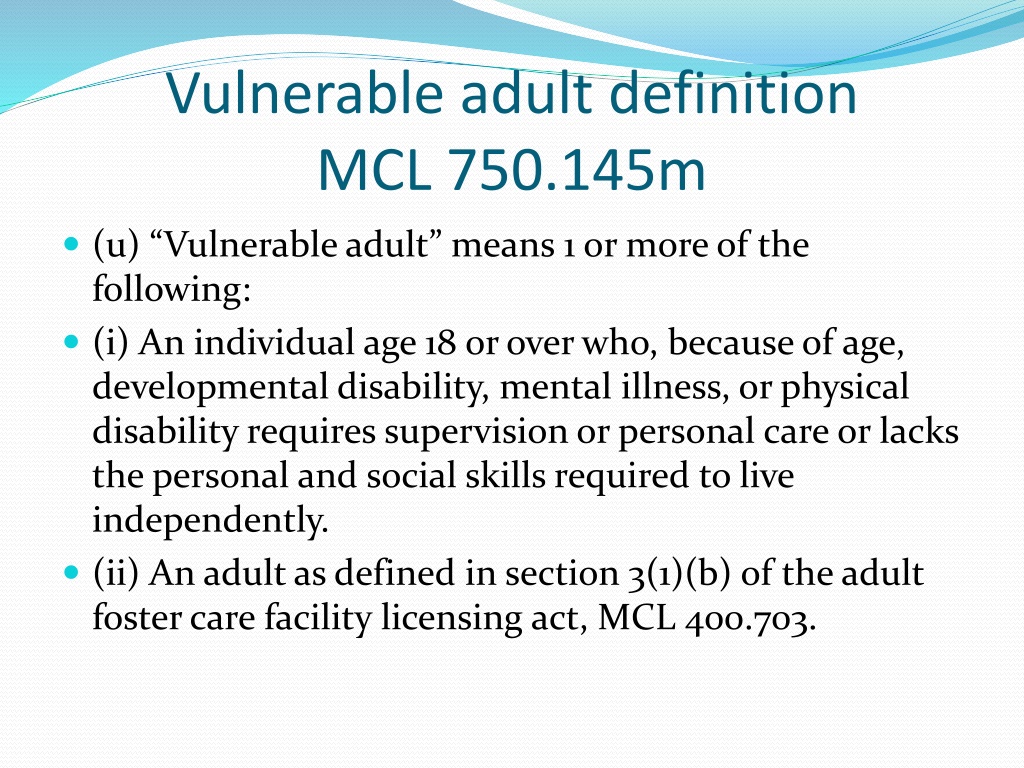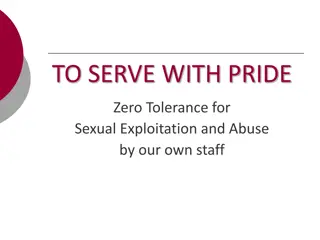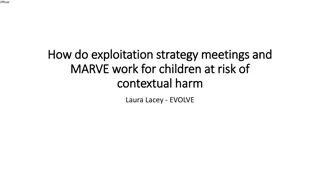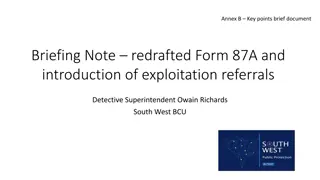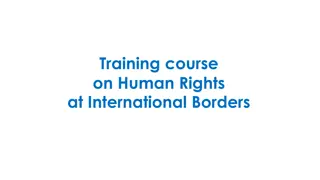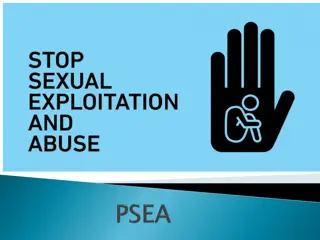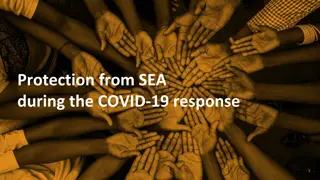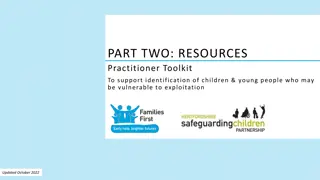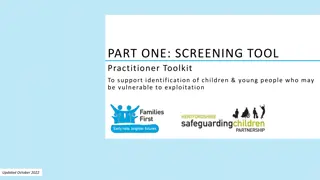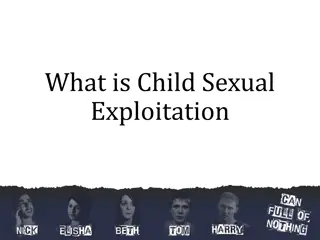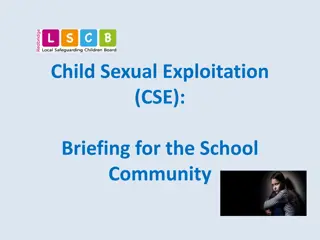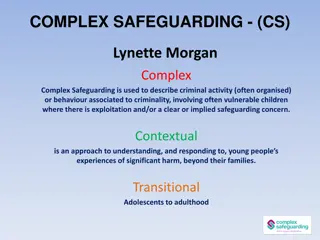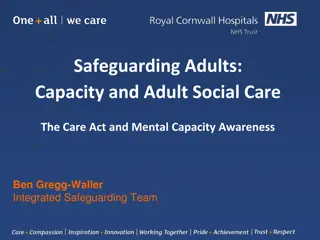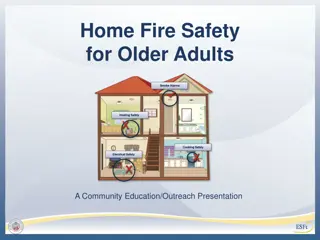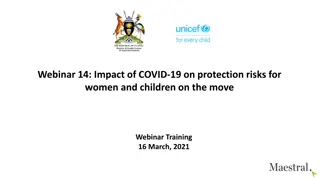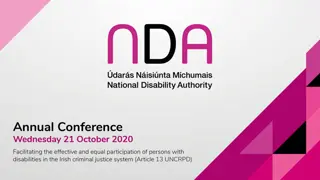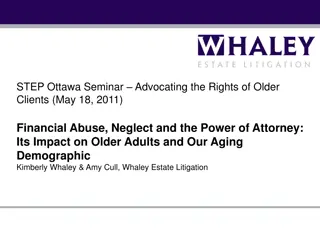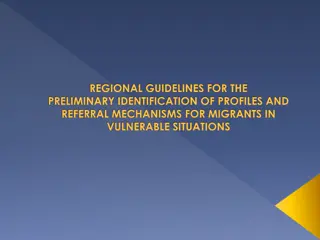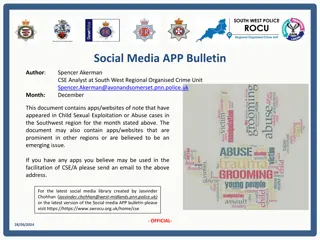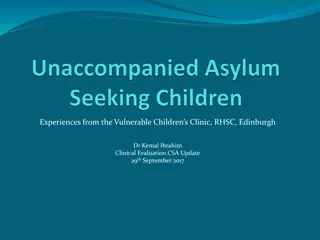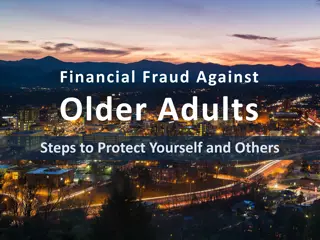Risks of Financial Exploitation Faced by Vulnerable Adults
Vulnerable adults, including those with disabilities or cognitive impairments, are at risk of financial exploitation through scams like IRS fraud, family emergency scams, and healthcare insurance fraud. Elder financial abuse is on the rise, with billions of dollars lost annually. Recognizing these scams and safeguarding vulnerable adults' financial well-being is crucial to prevent financial exploitation.
Download Presentation

Please find below an Image/Link to download the presentation.
The content on the website is provided AS IS for your information and personal use only. It may not be sold, licensed, or shared on other websites without obtaining consent from the author. Download presentation by click this link. If you encounter any issues during the download, it is possible that the publisher has removed the file from their server.
E N D
Presentation Transcript
Vulnerable adult definition MCL 750.145m (u) Vulnerable adult means 1 or more of the following: (i) An individual age 18 or over who, because of age, developmental disability, mental illness, or physical disability requires supervision or personal care or lacks the personal and social skills required to live independently. (ii) An adult as defined in section 3(1)(b) of the adult foster care facility licensing act, MCL 400.703.
Vulnerable Adult Fraud Financial Exploitation: An action involving the misuse of an adult s funds, property or personal dignity by another person. Cognitive impairment diminishes the ability of older adults to make financial decisions. Physical and cognitive impairment forces older adults to depend and trust others to handle their financial affairs.
Elder Financial Abuse is Increasing 70% of personal wealth in US held by older adults (Met Life 2009) Persons 65 and older hold $15 trillion in assets (Glaciel, 2009) Losses exceed $2.9 billion annually (Met Life, 2011)
HEALTHCARE/HEALTH INSURANCE FRAUD SCAM Medical Equipment Fraud: Equipment manufacturers offer free products to individuals. Insurers are then charged for products that were not needed and/or may not have been delivered Rolling Lab Schemes: Unnecessary and sometimes fake tests are given to individuals at health clubs, retirement homes, or shopping malls and billed to insurance companies or Medicare
Medicare Fraud: Senior citizens are frequent targets of Medicare schemes, especially by medical equipment manufacturers who offer seniors free medical products in exchange for their Medicare numbers. Con artists fake doctors signatures or bribe corrupt doctors to sign the forms. Once a signature is in place, the manufactures bill Medicare for merchandise or services that was not needed or was ordered
CHARITY SCAMS Scammers posing as charity workers contact seniors and offer up a sad story which, of course, concludes with a plea for funding
CARD CRACKING You see a post on a social media site announcing a contest, or a gift card giveaway At some point, you re asked for your bank account information, PIN number, or online banking credential Once card crackers have access to your account, they deposit multiple phony checks usually remotely and then make quick ATM or money order withdrawals The goal is to get the cash before the bank figures out the checks are phony
JURY DUTY SCAM You receive a call from someone who is supposedly at the courthouse They claim that you have failed to report for jury duty and a warrant has been issued for your arrest You re then offered a choice to either pay for the warrant or have an officer sent over to arrest you. The fraudsters will typically demand that the money be paid by money transfer or by loading a prepaid card
UTILITY SCAM This is a fear based scam that involves convincing you that the utility company is about to cut off service due to unpaid bills The scammers will want money sent to them by money transfer or prepaid card
Exploitation (by family and Caregivers)
New POA Law MCL 700.5501. Effective May 22, 2012 Requires the agent to acknowledge the following limitations: Act as a fiduciary Follow principals instructions Provide an accounting upon request Keep the principal informed Failure to print the language in an agreement does not erase the criminal activity.
Common Practices by Abusers Obtain Power of Attorney Obtain a joint bank account with victim (victim places money into account, abuser removes money) Obtains a Quit Claim Deed to property Uses victims credit cards/ debit cards without permission Obtains credit/ property in victim s name Steals victim s personal property or medications
Tips Don t let one person control the money. Have an objective third party look over financial statements. Limit paid helpers. Consider providing a caregiver a monthly, pre-paid card to pay for groceries, etc. The card will track spending. Refresh powers of attorney with the new best interest clause . Refresh the Durable Power of Attorney to include the mandatory promise to act only in the best interest of the vulnerable adult.
The Criminal Justice Process Police/ A.P.S. is contacted. Investigation is conducted. If evidence supports a charge, case is sent to Prosecutor. Prosecutor issues or denies a warrant. Abuser is arrested. Plea agreement or court hearing
Referral information Better Business Bureau, www.bbb.org (703) 207-0100 Federal Trade Commission, www.ftc.gov (202) 326- 2222 Credit report, www.annualcreditreport.com 1-800-525- 6285, 1-888-397-3742, 1-800-680-7289 Michigan Department of Regulatory Affairs (L.A.R.A.) www.michigan.gov/lara Michigan Attorney General, www.michigan.gov/ag (517) 373-1110 Adult Protective Services Hotline, (855) 444-3911
MI-MVP Michigan Model Vulnerable Adult Protocol Created by Department of Health and Human Services in 2013. Protocol created after several elder abuse laws passed in 2012 (PA 175). Adapted at the local level. 34 counties as of 10/20/15.
Vulnerable Adult Network Midland County MCVAN Started February 2015. First Group meeting May 2015. Community Partners Prosecuting Attorney, Midland Police & Sheriff, DHHS, Senior Services, Public Guardian, CMH, MMMC, Financial Institution, Shelterhouse, Health Department, The ARC and others.
Vulnerable Adult Network Vulnerable Adult 18 years and older who is unable to protect him/herself from abuse, neglect or exploitation because of mental or physical impairment or advanced age. Agreement (Protocol) Adopted Oct 2015 Monthly meetings case review & business Education -- general public and professionals
Investigative Team Coordinate thorough and objective investigations. Act within an appropriate response time. Minimize victim trauma. Respect rights of alleged perpetrator. Feedback to partner agencies.
Agreement - Purpose Protect & serve, conduct coordinated & efficient investigations. Increase our understanding of the complex issues surrounding abuse or neglect. Enhance understanding of the role each partner agency has during investigation, minimize duplicate efforts. Commit to conducting case review to help determine most effective manner to assist in the investigation, help identify the needs of and provide services, including wellness checks and monitoring. Honor rights of vulnerable adults to make own decisions.
Reporting Michigan Centralized Intake for Abuse and Neglect (855) 444-3911
